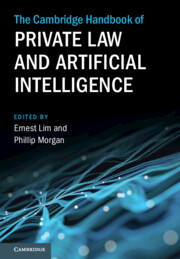Book contents
- The Cambridge Handbook of Private Law and Artificial Intelligence
- Reviews
- The Cambridge Handbook of Private Law and Artificial Intelligence
- Copyright page
- Dedication
- Contents
- Figures
- Table
- Contributors
- Acknowledgements
- Abbreviations
- Introduction
- 1 AI for Lawyers
- 2 Computable Law and AI
- Part I Law of Obligations
- Part II Property
- Part III Corporate and Commercial Law
- 18 Corporate Law, Corporate Governance and AI: Are We Ready for Robots in the Boardroom?
- 19 Financial Supervision and AI
- 20 Financial Advisory Intermediaries and AI
- 21 Competition Law and AI
- 22 Sales Law and AI
- 23 Commercial Dispute Resolution and AI
- 24 Insurance Law and AI
- 25 Securities Regulation and AI
- 26 Employment Law and AI
- Part IV Comparative Perspectives
- Index
21 - Competition Law and AI
from Part III - Corporate and Commercial Law
Published online by Cambridge University Press: 21 March 2024
- The Cambridge Handbook of Private Law and Artificial Intelligence
- Reviews
- The Cambridge Handbook of Private Law and Artificial Intelligence
- Copyright page
- Dedication
- Contents
- Figures
- Table
- Contributors
- Acknowledgements
- Abbreviations
- Introduction
- 1 AI for Lawyers
- 2 Computable Law and AI
- Part I Law of Obligations
- Part II Property
- Part III Corporate and Commercial Law
- 18 Corporate Law, Corporate Governance and AI: Are We Ready for Robots in the Boardroom?
- 19 Financial Supervision and AI
- 20 Financial Advisory Intermediaries and AI
- 21 Competition Law and AI
- 22 Sales Law and AI
- 23 Commercial Dispute Resolution and AI
- 24 Insurance Law and AI
- 25 Securities Regulation and AI
- 26 Employment Law and AI
- Part IV Comparative Perspectives
- Index
Summary
The legal treatment of autonomous algorithmic collusion in light of its technical feasibility and various theoretical considerations is an important issue because autonomous algorithmic collusion raises difficult questions concerning the attribution of conduct by algorithms to firms and reopens the longstanding debate about the legality of tacit collusion. Algorithmic collusion, namely, direct communication between algorithms, which amounts to express collusion, is illegal. Intelligent and independent adaptation to competitors’ conduct by algorithms with no direct communication between them, which is tacit collusion, is generally legal. There should be ex ante regulation to reduce algorithmic collusion.
- Type
- Chapter
- Information
- Publisher: Cambridge University PressPrint publication year: 2024

